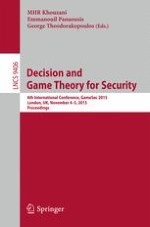2015 | OriginalPaper | Buchkapitel
When the Winning Move is Not to Play: Games of Deterrence in Cyber Security
verfasst von : Chad Heitzenrater, Greg Taylor, Andrew Simpson
Erschienen in: Decision and Game Theory for Security
Aktivieren Sie unsere intelligente Suche, um passende Fachinhalte oder Patente zu finden.
Wählen Sie Textabschnitte aus um mit Künstlicher Intelligenz passenden Patente zu finden. powered by
Markieren Sie Textabschnitte, um KI-gestützt weitere passende Inhalte zu finden. powered by
